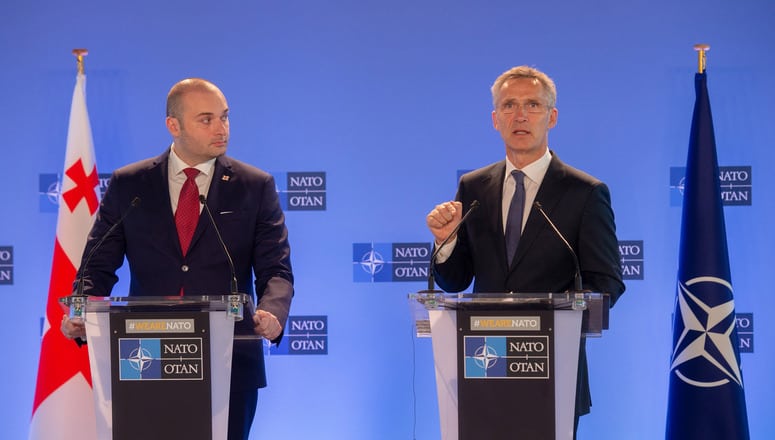 Courtesy: NATO
Courtesy: NATO
The West’s Message to Georgia: No Guarantees
A few days ago at the UN General Assembly, Prime Minister Makuma Bakhtadze of Georgia demanded that Russia remove its forces from Abkhazia and South Ossetia. The demand served to remind the world of Georgia’s situation, especially since the headlines have been dominated by the rather similar Ukrainian conflict. Last August marked the ten year anniversary of the Russo-Georgian War, and the Russian-backed breakaway of Abkhazia and South Ossetia has been deemed a frozen conflict. Strong criticism remains aimed towards all sides of the conflict, regardless of U.S. and European support to Georgia’s claims of sovereignty and the pre-2008 promises of NATO admission. Earlier in the year, Prime Minister Dimitry Medvedev commented that Georgian admission into NATO is unnecessary could even provoke a horrible conflict. With its European aspirations and a refusal to Russian influence, Chancellor Angela Merkel’s recent visit to The Republic of Georgia gives us some insight on the why Georgia faces a lonely road on its own as its frozen conflict becomes the new norm.
On August 23, Chancellor Angela Merkel embarked on a three-day trip to Georgia, Armenia, and Azerbaijan. Visiting Georgia first, Chancellor Merkel was asked about the secessionist movements of South Ossetia and Abkhazia in Georgia and its European integration. While Chancellor Merkel provided answers to these issues, she failed to deliver any semblance of concrete policy.
Chancellor Merkel’s visit had many wondering which organization she represented during her trip. Was it NATO? The EU? Or merely Germany? The answer is a combination of all three, but the degrees to which she represented each entity varied per South Caucasian republic. One of the main topics discussed between Chancellor Merkel and Georgian Prime Minister Bakhtadze was the spike in Georgian applications for asylum in Germany. Addressing the raised concern of possible EU visa suspension, Merkel assured Georgia would go on the list of safe countries of origin, which would weaken the claims of asylum seekers who seek refuge in Germany. Through this statement, it was clear Chancellor Merkel spoke as the Chancellor of Germany.
When asked about Georgia’s potential NATO admission at Tbilisi State University, Merkel directly said that she did not visualize Georgia becoming a NATO member any time soon. Georgia clearly aspires to join NATO and the EU and has contributed soldiers to NATO missions in Afghanistan, Kosovo, and counterterrorism missions. Merkel’s statement marks a continuation in Germany’s stance regarding Georgia’s NATO membership since Germany and France led the opposition against granting Georgia a Membership Action Plan back in 2016. However, Merkel did comment on how the situation between Russia and Georgia was unfair, and reasserted that Abkhazia and South Ossetia were sovereign Georgian territories. Merkel described the situation in Georgia as a “Russian occupation” only after a student directly asked her about it. Russian analysts note how German support to Georgia’s NATO entry would considerably hurt Russo-German relations, a much discussed topic due to the development of Nord Stream 2. Regardless, Chancellor Merkel visited the “occupation line” in Odzisi alongside representatives of the EU monitoring mission but failed to give any concrete solutions on how to rectify the situation between Georgia and Russia. Instead, the German Chancellor promoted the image of Germany as a mediator and called for a peaceful solution in the region. Essentially, Merkel openly told the Georgians that she would not support Georgia’s entry to the alliance and failed to provide concrete solutions to the occupations of Abkhazia and South Ossetia.
Additionally, Chancellor Merkel stated she would not make any promises about Georgia’s admission to the EU any time soon. She also commented that the Western Balkans had priority and that she did not see Georgian membership into the EU for another five years. Despite the Free Trade Agreement between the EU and Georgia, the German Chancellor conceded that only after the possible integration of the Western Balkans, Georgia and Ukraine would follow. Overall, Merkel told the Georgians they were on their own despite their eagerness for European integration.
Overall, Chancellor Merkel’s visit to Georgia is perhaps the highest profile visit by a Western politician in years. However, her remarks contribute to the stalemate at hand between Georgia and Russia. Without concrete policy suggestions looking beyond Georgia’s interest in NATO, the Georgians are left at a crossroads.





